The Consumer Price Index (CPI) in Northern Mindanao for the month of November 2021 registered at 133.7 which implies that the price of a basket of goods in November 2021 was 33.7 percent higher than its price in 2012. The CPI is an indicator of the change in the average retail prices of a fixed basket of goods and services commonly purchased by households relative to a base year. (Figure 1)
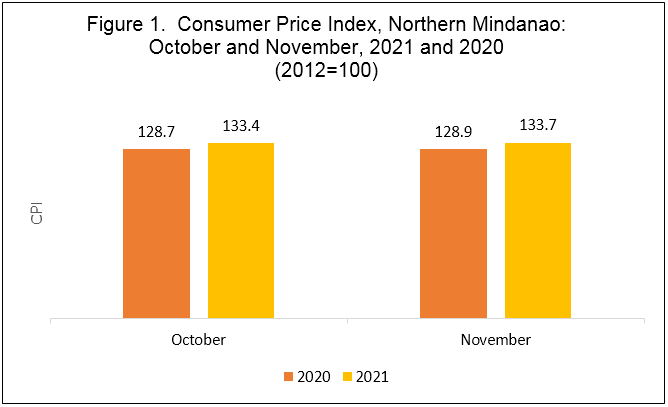
Among the commodity groups, Alcoholic Beverages and Tobacco posted the highest CPI in November 2021 at 262.8, followed by Housing, Water, Electricity, Gas, and Other Fuels at 149.3, and Restaurant and Miscellaneous Goods and Services at 135.3. On the other hand, Clothing and footwear at 119.3, Recreation and Culture at 115.0, and Communication at 106.7 were the three commodity groups with the lowest CPI recorded in the month of November 2021. (Figure 2)
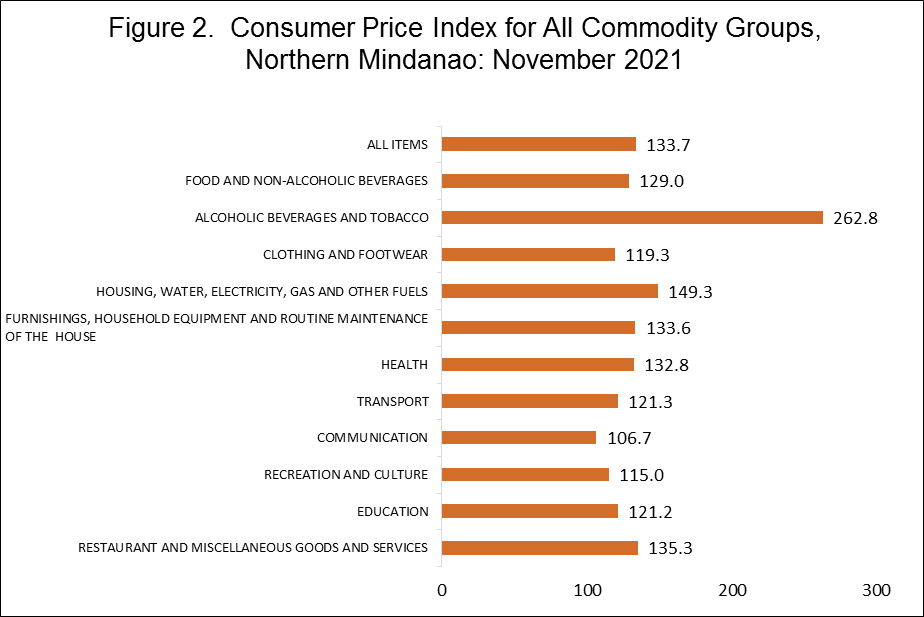
All provinces demonstrated an increase in CPI for November 2021 as compared to the same month in 2020 with Misamis Occidental posting the highest CPI at 137.6 and Lanao del Norte posting the lowest at 132.2. (Table 1)
Table 1. Consumer Price Index for All Commodity Groups by Province, Northern Mindanao: November, 2021 and 2020(2012=100)
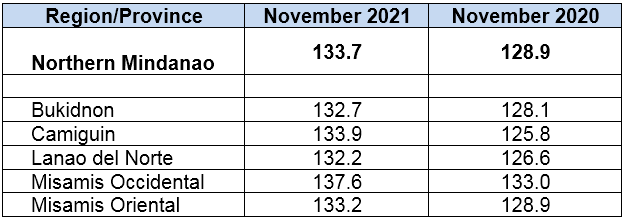
November 2021 Regional Inflation Accelerates
Regional inflation in November 2021 registered at 3.7 percent from 2.4 percent in November 2020 which implies that the prices of goods and services in November 2021 increased at a faster pace compared to November 2020. The regional inflation rate of 3.7 percent was sustained for three months since September 2021. (Figure 3)
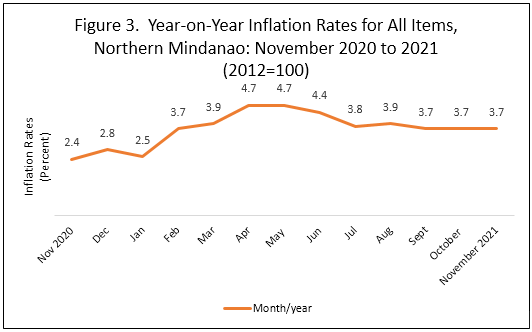
Among the provinces, Camiguin posted the highest inflation rate at 6.4 percent, while Misamis Oriental posted the lowest at 3.3 percent. (Table 2)
Table 2. Year-on-Year Inflation Rates for All Items by Province, Northern Mindanao: November, 2021 and 2020 (2012=100)
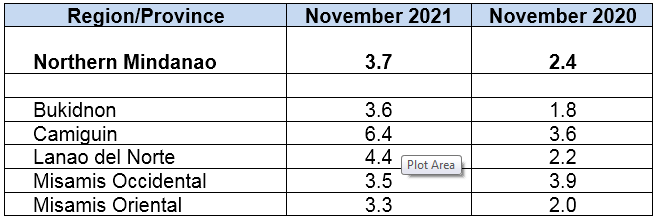
Purchasing Power of Peso (PPP)
The Purchasing Power of Peso (PPP) shows the real value of the peso relative to the base period. The PPP in Northern Mindanao dropped to PhP 0.75 in November 2021 from PhP 0.78 in November 2020. This means that a consumer’s PhP 100 in 2012 can only purchase PhP 75.0 worth of goods and services in November 2021.
All provinces showed a lower PPP in November 2021 compared to November 2020. Misamis Occidental registered the lowest decline of PhP 0.02. (Figure 4)
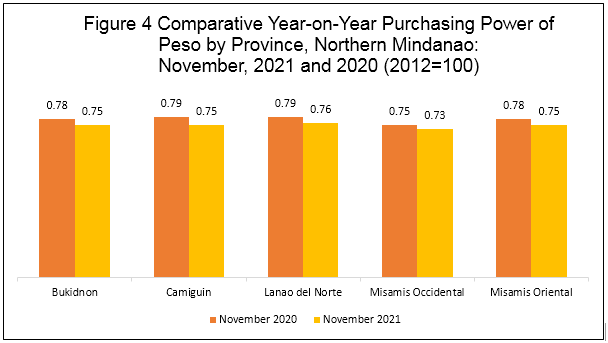
TECHNICAL NOTES
Consumer Price Index (CPI) – The CPI is an indicator of the changes in the average retail prices of a fixed basket of goods and services commonly purchased by households relative to a base year.
Used of CPI – CPI is most widely used in the calculation of the inflation rate and purchasing power of peso. It is a major statistical series used for economic analysis and as a monitoring indicator of government economic policy.
Computation of CPI – The computation of the CPI involves consideration of the following important points:
a. Base Period – The reference data or base period is the benchmark or reference date or period at which the index is taken as equal to100.
b. Market Basket – A sample of the thousands of varieties of goods purchased for consumption and services availed by the households in the country selected to represent the composite price behavior of all goods and services purchased by consumers.
c. Weighing System – The weighing pattern uses the expenditures on various consumer items purchased by households as a proportion to total expenditure.
d. Formula – The formula used in computing the CPI is the weighted arithmetic mean of price relatives, the Laspeyre’s formula with a fixed base year period (2012) weights.
e. Geographic Coverage – CPI values are computed at the national, regional, and provincial levels, and for selected cities.
Inflation Rate (IR) – is the rate of change of the CPI expressed in percent. Inflation is interpreted in terms of declining purchasing power of peso.
Purchasing Power of Peso (PPP) – shows how much the peso in the base period is worth in the current period. It is computed as the reciprocal of the CPI for the period under review multiplied by 100.

